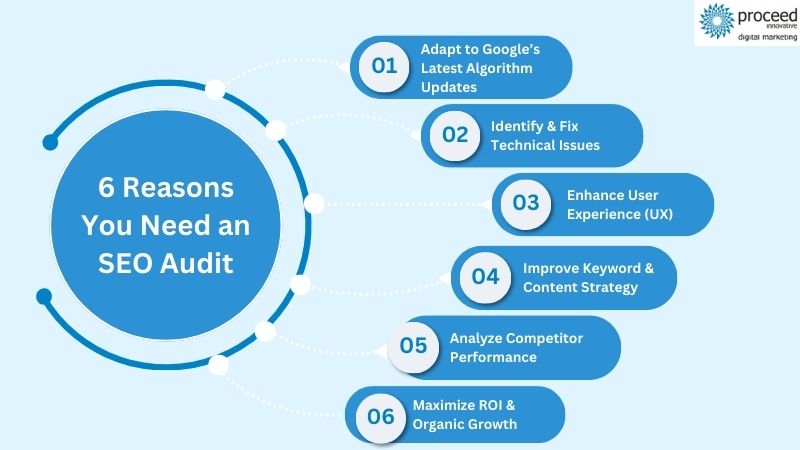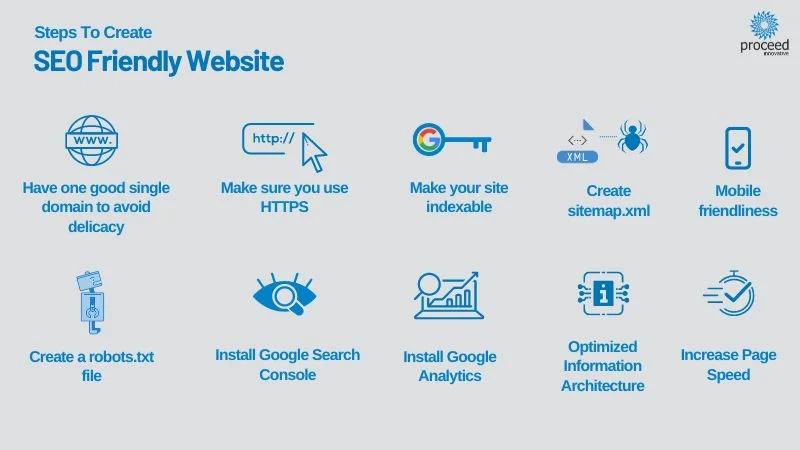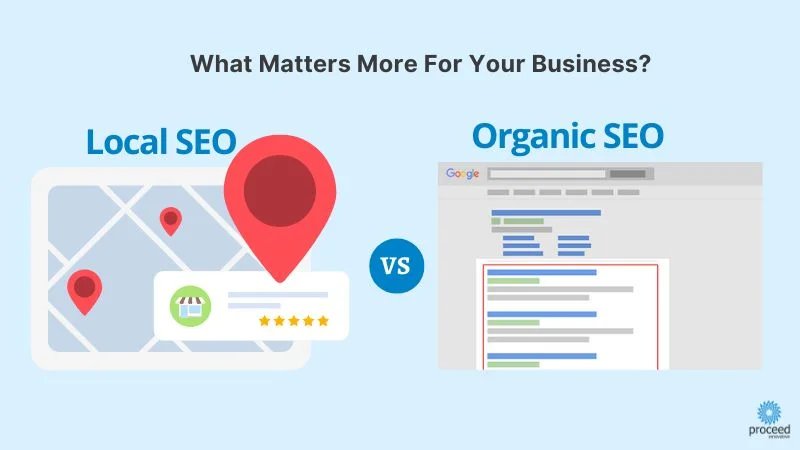Table of content
Your website is often the introduction of your business to potential customers, which makes it important for your site to not only be found online, but also to perform and function well to create a good user experience. The digital landscape is highly competitive for businesses across industries and if your website is not visible enough or performing well, you will lose potential customers to your competitors.
If you want your business to be competitive in 2025, it is crucial to make sure your website is performing well to improve your online visibility and drive more traffic. The best way to check the performance of your website is to work with a digital marketing agency to complete an SEO audit. SEO audits evaluate the technical functionality, optimization, backlink profiles, content quality, and user experience of your website to identify strengths, weaknesses, and opportunities for improvement.

The algorithms for search engines like Google are constantly evolving. An SEO audit evaluates how well your website is optimized to rank in the search engine results pages (SERPs) under the latest algorithm updates. These audits also identify technical issues such as broken links and slow loading speeds that affect the overall performance of your website and provide actionable insights to address and resolve these issues. In this guide, we will discuss how getting an SEO audit of your website can help you improve performance and visibility and keep your business competitive in 2025.
Adapt to Changing Search Engine Algorithms
Search engines like Google frequently update their algorithms to deliver the most relevant and accurate results to users. These algorithms evaluate websites based on factors such as technical performance, content quality, and user experience. While these updates enhance the search experience for users, businesses that fail to adapt risk lower rankings, resulting in reduced visibility and traffic.
SEO audits evaluate how well your website performs based on the current ranking factors to identify areas for improvement. This includes technical aspects of your website that can affect the user experience such as slow page loading speed, broken links, and poor navigation. Technical issues that negatively impact the performance of your website can lead to a drop in rankings.
SEO audits also evaluate the content of your website to ensure that your content and keyword strategies align with the current algorithm. With search engines prioritizing semantic search and user intent, relying solely on keyword optimization is no longer sufficient. An effective strategy now requires creating content that truly meets user needs and expectations.
Regular SEO audits are essential to keeping your website optimized and competitive as search engine algorithms evolve. By addressing technical issues, refining content strategies, and aligning with search engine updates, businesses can maintain strong rankings, enhance user experience, and drive consistent traffic. Staying proactive with SEO ensures long-term success in an evolving search environment.
Evaluate On-Page SEO
On-page SEO refers to the SEO aspects of your website such as content quality, keyword usage, metadata, and internal linking. If there is an issue with the on-page SEO, this can affect your rankings in the SERPS. SEO audits evaluate the on-page SEO of your website to identify issues that may be affecting your rankings.
The following are the main aspects of on-page SEO that are assessed with an SEO audit:
- Content: Content relevance is an important aspect of on-page SEO as search engines give preference to content that provides value and aligns with user intent. An SEO audit can help assess whether your content provides value to your target audience based on search trends and whether your content needs to be updated with new information and relevant keywords.
- Metadata: Metadata refers to the title tags and meta descriptions of each page on your website. The content in your metadata is only visible to search engines and has a major impact on how search engines understand and rank your website. An SEO audit can identify title tags and meta descriptions that can be better optimized.
- Internal linking: Internal linking is an important element of on-page SEO because search engines use the internal linking structure to crawl your website. An SEO audit checks the internal linking structure for broken links and helps ensure that the structure is logical and relevant to help search engines crawl your site more effectively.
Evaluate Backlink Profiles
Backlinks are the links to your website from other websites and they are an important ranking factor because they establish the authority and credibility of your website. While high-quality backlinks can help improve your rankings, low-quality, or toxic backlinks can be detrimental to your website’s performance and lower your rankings.
- High-quality backlinks: These are links that come from reputable websites that are relevant in your industry, and they carry significant weight.
- Toxic backlinks: These are links from irrelevant or low-quality websites such as link farms and spammy directories. Toxic backlinks can lower your rankings and even result in penalties from search engines.
An SEO audit evaluates the backlinks to your website to determine which links are providing value and which links are harmful to your website and should be removed. An audit can also identify new opportunities to build high-quality backlinks to strengthen your backlink profile and increase the credibility and authority of your website.

Evaluate Mobile and Core Web Vitals
Core Web Vitals and mobile optimization are crucial ranking factors in 2025. Evaluating these factors is one of the main focuses of an SEO audit to ensure that your website provides an excellent user experience while aligning with search engine requirements.
- Core Web Vitals: Core Web Vitals include metrics that measure loading speed, interactivity, visual stability, and other aspects of your website that can impact the user experience. An SEO audit can identify issues with the performance of the Core Web Vitals and suggest ways in which they can be improved.
- Mobile responsiveness: Mobile-first indexing is the standard for search engines as they largely base their rankings on an evaluation of the mobile version of your website. This makes it very important for your website to be mobile responsive. An SEO audit evaluates the display and functionality of the mobile version of your website and identifies issues that need to be resolved. Improving mobile responsiveness reduces bounce rates and increases engagement from mobile users.
Optimize Local SEO and Business Profiles
For businesses targeting a local audience, optimizing their website for local SEO is essential. A thorough SEO audit can evaluate how well your site is optimized for your specific geographic markets and offer actionable recommendations to enhance your local online visibility.
An important step of an SEO audit is to evaluate your Google Business Profile (GBP) listing. This includes ensuring that the business information on the listing is accurate and consistent with the information on your website as inconsistent or inaccurate information can hurt your rankings. Audits also evaluate user engagement on your GBP profile, including whether your customers are leaving reviews and if you are responding to their reviews. Getting good reviews increases your credibility which helps improve rankings.
An SEO audit also evaluates your website for local keywords such as “SEO services in Chicago,” and location-specific landing pages that can help drive traffic from local searches. Optimizing your website for local search queries helps increase your rankings in the local search results.
Competitor Analysis
An SEO audit goes beyond assessing your website’s performance, it also analyzes the SEO strategies of your key competitors. Gaining a deep understanding of their strengths and weaknesses allows you to refine your own approach, capitalize on opportunities, and fill gaps in their performance to stay ahead.
First, your main competitors are identified based on rankings in the search results. This may include direct competitors from your industry as well as businesses that may not be direct competitors but who are ranking for your target keywords. With an SEO audit, you can see which keywords your competitors are targeting as well as their backlink profiles and top-performing content. This helps you understand how they are ranking highly for certain keywords, whether it’s because of popular content on their website or quality backlinks. You can then replicate or improve on their strategies to become more competitive for the same keywords.
An SEO audit also highlights areas in which your competitors are underperforming. For instance, if a competitor’s website is lacking local landing pages, you can create these types of pages for your website to gain an edge.
Track SEO Performance Metrics
In order to fully understand the performance of your website and identify areas for improvement, you must be able to effectively manage the tracking and measuring of key SEO performance metrics. An SEO audit reviews your key metrics which can help you better assess your website performance and refine your approach.
- Organic traffic: Organic traffic is the traffic that comes to your website from the SERPs and is one of the main metrics used to evaluate SEO performance. An SEO audit will determine which pages are driving the most organic traffic and whether the traffic consists of your target audience. Pages that drive a lot of traffic but generate few conversions may require adjustments to the content or calls-to-action (CTAs).
- Keyword rankings: Keyword rankings are a key metric that reveal how well your website performs in the SERPs for specific targeted terms. Conducting SEO audits can uncover valuable opportunities for improvement by pinpointing keywords where your rankings may fall short. To boost your position for a targeted keyword, consider creating fresh, optimized content tailored to that term and strategically building backlinks to the relevant page.
- Conversion and bounce rates: Measuring your conversion rate—the percentage of visitors who turn into customers—and your bounce rate—the percentage of users who leave your site quickly—is essential. A high bounce rate could indicate the need for fresh, engaging content that better appeals to your target audience. Meanwhile, pages with high traffic but low conversion rates might benefit from stronger, more compelling calls-to-action (CTAs).
Prepare for Future SEO Trends
SEO audits are essential for identifying opportunities to enhance your website’s performance under current algorithm guidelines while preparing for future SEO trends. As search engines increasingly integrate AI into search results, audits can help you stay ahead by optimizing your content with natural language and conversational queries.
They also enable you to craft a strategy designed to withstand future algorithm changes. By focusing on key elements like fast loading times, mobile responsiveness, a strong backlink profile, and evergreen content, you can build a sustainable, long-term SEO approach that keeps your website competitive.
SEO Audits from Proceed Innovative
Ready to measure your website’s SEO performance and see how you stack up against the competition? Proceed Innovative offers comprehensive SEO audits designed to uncover opportunities for growth and deliver actionable strategies to boost your rankings. Our experts will analyze every aspect of your website, including on-page and technical SEO, backlink profiles, Core Web Vitals, mobile responsiveness, local SEO, and overall performance metrics. Additionally, we’ll conduct an in-depth competitor analysis to reveal their tactics and help you refine your strategy to gain a competitive edge.

Call Proceed Innovative at (800) 933-2402 or submit a contact form to schedule an SEO audit with our experts.






